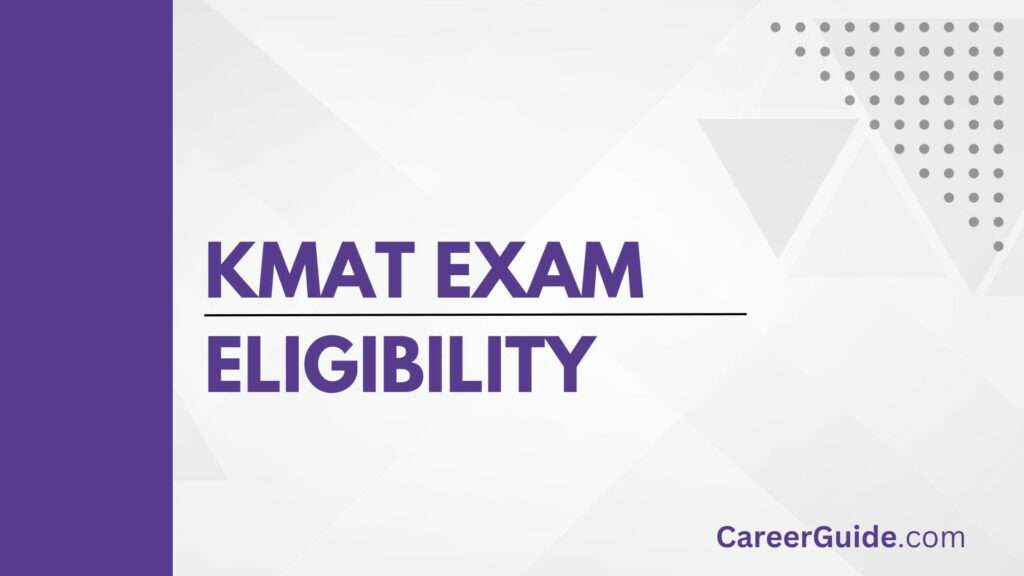KMAT Exam Eligibility: The Karnataka Management Aptitude Test (KMAT) is a state-level management entrance examination conducted by the Karnataka Private Post Graduate Colleges Association (KPPGCA). KMAT is a gateway for admission to MBA, PGDM, and MCA programs offered by various B-schools and universities in the state of Karnataka.
To succeed in KMAT, it’s crucial to have a comprehensive understanding of the exam syllabus. In this extensive guide, we will explore the KMAT syllabus in detail, covering various aspects of each section, key topics, and preparation strategies.

Importance of KMAT Eligibility Criteria
The eligibility criteria for KMAT play a pivotal role in determining who can appear for the examination. These criteria are established to ensure that candidates possess the necessary qualifications and meet specific requirements to pursue management education in Karnataka. Adhering to these criteria is essential to avoid any disqualification or complications during the admission process.
KMAT Eligibility Criteria in Detail
The KMAT eligibility criteria encompass several aspects, including nationality, educational qualifications, minimum marks, age limits, domicile requirements, and reservation policies. Let’s delve into each of these factors to provide a comprehensive understanding:
1. Nationality:
- KMAT is open to Indian citizens. As a fundamental requirement, only Indian nationals are eligible to apply for the examination.
2. Educational Qualification:
Educational qualifications are a fundamental aspect of KMAT eligibility. The eligibility criteria differ slightly depending on the type of program a candidate wishes to pursue:
For MBA/PGDM Programs:
- Candidates must hold a bachelor’s degree in any discipline from a recognized university or institution.
- The bachelor’s degree should have a minimum duration of three years.
For MCA Programs:
- Candidates must have a bachelor’s degree from a recognized university or institution.
- The bachelor’s degree should also have a minimum duration of three years.
- Additionally, candidates must have studied Mathematics at the 10+2 level or during their undergraduate education.
3. Minimum Marks:
- Unlike some entrance exams that specify a minimum percentage or CGPA, KMAT does not have a strict minimum marks requirement.
- However, individual participating institutions may have their own minimum score requirements.
- Candidates should refer to the admission guidelines of the specific institutions they plan to apply to for information on minimum marks.
4. Final Year Students:
- Candidates who are in the final year of their bachelor’s degree are eligible to apply for KMAT.
- However, their admission will be considered provisional.
- Such candidates must provide proof of completing the qualifying examination within the specified time frame.
5. Age Limit:
- KMAT does not impose a specific age limit for candidates.
- Candidates of all age groups are eligible to appear for the exam.
KMAT Domicile Requirements
- KMAT is not limited to candidates from Karnataka. It is open to candidates from all states and Union Territories of India.
- There are no specific domicile requirements to take the KMAT exam.
- However, candidates should be aware that some institutions may have seats reserved for Karnataka domicile candidates or specific state quotas.
- These policies can vary from institution to institution, and candidates should review the admission guidelines of their chosen institutions for any specific requirements related to domicile.
KMAT Syllabus
Now, let’s dive into the detailed syllabus for each section of the KMAT exam:
1. Verbal Ability and Reading Comprehension:
This section evaluates your language skills, including your ability to understand and analyze written material effectively. Key topics in this section include:
Reading Comprehension: You’ll encounter passages on various topics and be asked questions that test your understanding of the passage, including its main idea, supporting details, and inferences.
Vocabulary: Questions related to synonyms, antonyms, analogies, and word meanings are common.
Grammar: This includes questions on sentence correction, spotting errors, sentence completion, and other grammar-related topics.
Jumbled Sentences: You may be required to arrange a set of jumbled sentences to form a coherent paragraph or sequence.
Sentence Rearrangement: Similar to jumbled sentences, this involves rearranging sentences to create a meaningful passage.
Para Jumbles: These questions require you to arrange a set of sentences to form a coherent paragraph.
Quantitative Ability
The Quantitative Ability section assesses your mathematical skills and ability to solve numerical problems. Key topics in this section include:
Arithmetic: This includes topics like percentages, ratios and proportions, profit and loss, time and work, time and distance, averages, and simple and compound interest.
Algebra: Algebraic topics such as equations, inequalities, functions, and quadratic equations are tested.
Geometry: Geometry questions may involve concepts related to lines, angles, triangles, circles, polygons, and mensuration.
Trigonometry: Basic trigonometric concepts and identities may be included in the syllabus.
Data Interpretation: Questions in this category require you to analyze and interpret data presented in various forms, including tables, graphs, charts, and diagrams.
Number System: Questions related to properties of numbers, divisibility rules, and remainders may be included.
Probability and Statistics: Basic concepts of probability and statistics, such as mean, median, mode, and standard deviation, may be tested.
Logical Reasoning
The Logical Reasoning section evaluates your ability to think logically, analyze information, and make deductions. It assesses your problem-solving skills and your ability to draw conclusions based on given information. Key topics in this section include:
Puzzles: Various types of puzzles, such as seating arrangement puzzles, arrangement-based puzzles, and grid-based puzzles, are commonly featured in this section. These require logical thinking and the ability to make connections.
Blood Relations: Questions related to familial relationships, often involving complex family trees, are asked to assess your ability to deduce relationships.
Coding-Decoding: These questions involve coding and decoding words or phrases using specific patterns or rules.
Series: This includes number series, letter series, and mixed series questions that require identifying patterns and predicting the next item in the series.
Syllogism: Syllogism questions test your ability to draw logical conclusions from given statements using Venn diagrams or other logical methods.
Direction Sense: Questions related to directions, distances, and movement of objects or individuals.
Assumptions and Conclusions: You’ll be asked to identify assumptions underlying an argument and draw logical conclusions based on given information.
Data Sufficiency: These questions assess your ability to determine whether the given data is sufficient to answer a specific question.
Preparation Tips for KMAT
Now that you’re familiar with the KMAT syllabus, here are some tips to help you prepare effectively:
Understand the Syllabus: Start by thoroughly understanding the syllabus and the topics covered in each section.
Create a Study Plan: Develop a study plan that covers all sections of the syllabus. Allocate more time to areas where you need improvement.
Practice Regularly: Regular practice is the key to success. Solve a variety of questions from different topics to enhance your problem-solving abilities.
Mock Tests: Take full-length mock tests regularly to simulate the actual exam environment. Analyze your performance in these tests to identify areas that need improvement.
Focus on Weak Areas: Identify your weak areas and work on improving them. Whether it’s mathematics, reasoning, or language skills, targeted practice can make a significant difference.
Speed and Accuracy: KMAT demands both speed and accuracy. Strive to strike a balance between solving questions quickly and ensuring they are correct.
Reading Habit: Develop a habit of reading newspapers, magazines, and business articles to improve your reading comprehension skills.
Stay Updated: Keep up with current affairs and general knowledge as they are often tested in reading comprehension passages.
Stay Calm: On the day of the exam, stay calm and composed. Avoid last-minute cramming and focus on what you’ve learned during your preparation.
No Negative Marking Advantage: Remember that as of my last knowledge update in September 2021, KMAT did not have negative marking. So, attempt all questions, even if you are unsure about some.
KMAT Score Validity
The KMAT score is valid for one year from the date of the exam. This means that you can use your KMAT score to apply for MBA and PGDM programs in the year in which you took the exam and the following year.
For example, if you took the KMAT exam in May 2023, your score will be valid until May 2024. You can use your score to apply for MBA and PGDM programs in the academic year 2023-24 and the academic year 2024-25.
It is important to note that some B-schools may have their own score validity policy. For example, some B-schools may accept KMAT scores that are only six months old. It is always advisable to check the admission criteria of the B-schools you are interested in before applying.
Here are some tips for using your KMAT score effectively:
- Start early. The KMAT admission process can be time-consuming, so it is important to start early. Research the B-schools you are interested in and submit your applications as soon as possible.
- Be prepared for interviews. Many B-schools will conduct interviews for shortlisted candidates. Be prepared to answer questions about your academic background, your work experience, and your career goals.
- Follow up with the B-schools you have applied to. After you have submitted your application, follow up with the B-schools to check the status of your application and to answer any questions they may have.
I hope this information is helpful. Please let me know if you have any other questions.
KMAT Reservation Policy
The following reservation policy is applicable to the KMAT exam:
- Scheduled Castes (SC): 15%
- Scheduled Tribes (ST): 7.5%
- Other Backward Classes (OBC): 27%
To avail the reservation benefits, candidates must submit the required caste certificate or other relevant documents at the time of admission.
Note: The reservation policy may vary slightly from B-school to B-school. It is always advisable to check the reservation policy of the B-schools you are interested in before applying for the KMAT exam.
Here are some additional points to keep in mind about the KMAT reservation policy:
- The reservation policy is applicable to all seats in the KMAT participating B-schools.
- The reservation policy is applicable to both government and private B-schools.
- The reservation policy is applicable to all categories of candidates, including general category candidates, reserved category candidates, and foreign nationals.
If you have any questions about the KMAT reservation policy, you can contact the KSPITTC office.
Other Requirements
- In addition to the general eligibility criteria outlined above, candidates should be aware that individual participating institutions may have specific admission requirements.
- These additional requirements could include criteria such as work experience, entrance test scores other than KMAT, group discussion, and personal interview performance.
- Candidates must thoroughly review the admission guidelines of the institutions they are interested in to ensure they meet all requirements.
FAQs
To be eligible to apply for the KMAT exam, candidates must:
- Have a bachelor’s degree of at least 3 years duration from any recognized college or university.
- Have secured a minimum of 50% aggregate marks in the qualifying examination (45% for SC/ST candidates).
- Final year students are also eligible to apply.
A: No, there is no age limit for the KMAT exam.
A: Yes, candidates from any part of India or abroad are eligible to apply for the KMAT exam.
A: There are no domicile requirements for the KMAT exam.
A: In addition to the general eligibility criteria, candidates who are applying for MCA programs through KMAT must also have studied Mathematics at the 10+2 level or at the graduation level.










